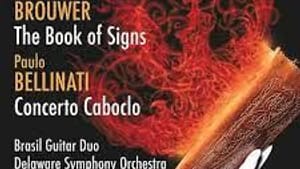Stay in the Loop
BSR publishes on a weekly schedule, with an email newsletter every Wednesday and Thursday morning. There’s no paywall, and subscribing is always free.
A showcase for solo and symphony
DSO and Brasil Guitar Duo present ‘The Book of Signs’ and ‘Concerto Caboclo’

With seasons cancelled and people seeking inspiration, it’s an apt time to revisit an uplifting Grammy-nominated recording by the Delaware Symphony Orchestra and Brasil Guitar Duo. Energizing yet comforting, the recording features two redolent works for guitar and orchestra, The Book of Signs and Concerto Caboclo. The DSO, impeccably conducted by David Amado, partners with guitar virtuosos João Luiz and Douglas Lora in works by two composers who intimately understand both guitar and orchestra and write beautifully for the combination.
Leo Brouwer and ‘The Book of Signs’
Prolific legendary guitarist Leo Brouwer (b. 1939) comes from a family famous in Cuban pop music, a path he chose not to follow. One of the 20th century’s most important Latin American composers, Brouwer is also a conductor who studied composition at Juilliard with Vincent Persichetti (among others). As well as more than 80 works for guitar in varying configurations—he once wrote a piece for 300 guitarists—Brouwer’s storied career includes dozens of orchestral and chamber-music works and scores of films (including Like Water for Chocolate).
Written for two guitars and string orchestra, The Book of Signs was composed in 2003 and has been played worldwide, but this is its first recording. Amado programmed the work’s American premiere in 2016, timed with a thaw in US-Cuban relations. But it was Luiz’s and Lora’s electrifying performance at Havana’s 2014 landmark “Festival Leo Brouwer” that garnered them the composer’s permission for this first-ever recording.
Works for guitar and orchestra are not standard fare, and this double concerto (also not a common form) for soloists on the same instrument is doubly interesting. Brouwer has written a dozen guitar concerti, but The Book of Signs (Number 10) was his first for duo guitarists.
Mystery and motion
The work is a shimmering piece that tightly weaves soloists and strings in a musical tapestry. Its sweeping first movement, “Signs of Memory,” begins with mysterious chords introducing a set of 18 variations built on Beethoven’s “32 Variations in C Minor.” The initial lulling repetition builds in intensity and dynamism as soloists and orchestra (equally matched) move between major and minor, and the opening motif periodically reappears.
The second movement, “Variations on a Sentimental Theme,” displays Brouwer’s cinematic writing. It also opens with rich orchestral chords as the soloists introduce, then embroider a touching lyrical melody. The untitled third allegro movement is a rondo, its dance-like pattern built on repetition of five syncopated notes that showcase the Duo’s justly lauded guitar work.

The Book of Signs is a showcase for both soloists and the DSO strings. It sinuously meshes Latin rhythms and classical forms, juxtaposing rests and silence with rushing motion. Its often lambent quality masks strong construction and Brouwer’s savvy instrumentation of guitars and orchestra. The work is filled with gleaming facets and shape-shifting luminous chords, melding soloistic and symphonic passages into an intricate work of mesmerizing beauty.
Bellinati and the ‘Concerto Caboclo’
The recording’s second half features another lyrical work, Concerto Caboclo for Two Guitars and Orchestra. Commissioned in 2011 by the São Paulo Orchestra for the Brasil Guitar Duo, it was composed by Brazilian Paulo Bellinati (b. 1950), well known in Latin America as a guitarist, composer, and music scholar. This shorter three-movement work merges contemporary technique and musical vocabulary with traditional rhythms and performance traditions. The title refers to a person of mixed ancestry who sings and plays capira, the folk music of São Paulo State.
The concerto opens with a gentle extended solo guitar passage (the first of two cadenzas), and in this movement (“Toada”), the composer treats the guitars almost as a single instrument. While Brouwer weaves soloists and symphony into a tight-knit fabric, Bellinati accesses the concerto tradition of alternating solo sections with the full orchestra.
Its dreamy, luscious second movement (“Moda di Viola”) is inspired by a Brazilian call-and-response song tradition, here realized by a dialogue between soloists and orchestra. The third movement, “Porteando,” is in the Brazilian finger-picking style that creates a riveting ostinato and affords the Duo some jaunty and stylistic guitar work.
Intimacy and mastery
This excellent recording was engineered and edited by Adam Abeshouse, and Luiz wrote the comprehensive, scholarly liner notes. Throughout, Amado leads the Delaware Symphony with grace, élan, and sensitivity to the guitarists’ musical requirements. Luiz and Lora, who have played together for almost half their lives, have an intimacy and near-effortless mastery here that clearly illustrates and enhances their stellar reputation among guitar virtuosi.
What, When, Where
Delaware Symphony Orchestra, The Book of Signs (Leo Brouwer) and Concerto Caboclo (Paulo Bellinati). David Amado conducting, with soloists João Luiz and Douglas Lora of Brasil Guitar Duo. Find it here.
Sign up for our newsletter
All of the week's new articles, all in one place. Sign up for the free weekly BSR newsletters, and don't miss a conversation.

 Gail Obenreder
Gail Obenreder